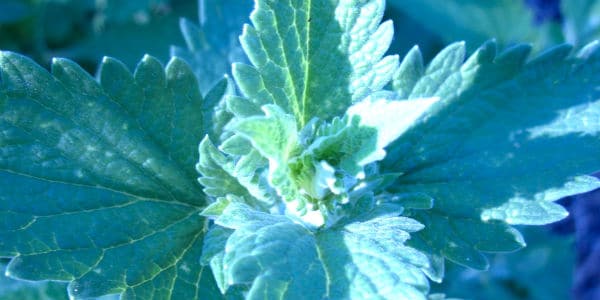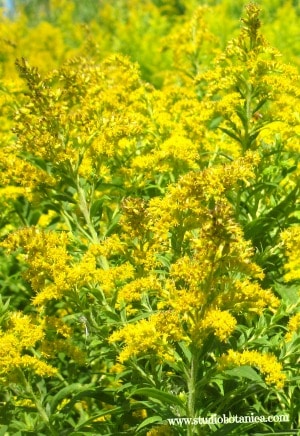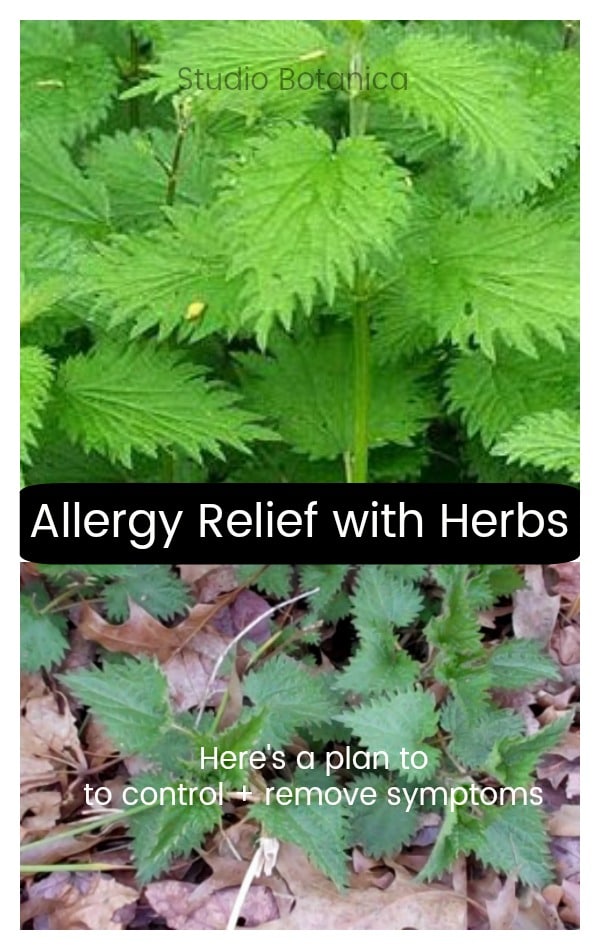Each year, it seems that ‘allergy season’ arrives earlier and more people seem to be affected. Have you noticed this trend? Do you or anyone you know suffer from seasonal allergies? I find that more and more friends and clients want to know about herbs for allergy relief so I am sharing some basics today + a recipe for a delicious tea blend! Allergy herbs can indeed become a part of your anti-allergy plan!
What ABOUT ALLERGIES ?
For those who suffer from allergies, symptoms can include: watery, itchy eyes, scratchy throats and runny noses.
Allergy relief with herbs and a special supplement can make a welcome difference!
Sometimes it really helps to understand just what is going on when allergy symptoms flare up. The allergic reaction which happens when our immune system overreacts to a substance we've inhaled, like tree pollen, is called allergic rhinitis.
There are two types ~ seasonal (often called hayfever) and perennial (which exists year-round). Hay fever is caused by outdoor allergens while perennial allergic rhinitis is caused by indoor culprits; allergens such as mold, pet dander or dust mites.
People who experience allergic rhinitis look like they have a cold; in fact, they can experience all of the same symptoms but this misery is not caused by a virus in the way that a cold is.
Our immune system goes into action when we breathe in an allergen (particles our body considers foreign) and our plasma cells release a substance called IgE (Immunoglobulin E) which is an antibody specific to that allergen. IgE attaches to the surface of our mast cells which are found in large numbers in the "surface tissues" such as those found close to the "outside"; such as in our skin as well as the mucous membranes of our nose where they help mediate inflammatory responses.
Allergic rhinitis is common, affecting more than 1 in 5 people in North America. Symptoms can be mild or severe. Many people who have allergic rhinitis also have asthma.
Allergic rhinitis can cause many symptoms, including the following:
- Fatigue
- Dark circles under the eyes
- Dry cough
- Sneezing
- Post-nasal drip
- Red, itchy, and watery eyes
- Swollen eyelids
- Itchy mouth, throat, ears, and face
- Sore throat
- Stuffy, runny nose
- Headaches, facial pain or pressure
- Partial loss of hearing, smell, and taste
What causes allergies?
Our immune system is designed to fight harmful substances like bacteria and viruses, but in allergic rhinitis, it over-reacts to harmless substances -- like various molds, pollen, and pet dander -- and promptly reacts. This reaction, which may feel more like an "attack", is called an allergic reaction.
Seasonal allergic rhinitis is caused by an allergic reaction to pollen and spores (depending on the season and area) carried on the wind.
What are the sources of our allergies?
Grass pollen (late spring and summer)
Tree pollen (spring)^^
Fungus (mold growing on dead leaves, common in summer)
Ragweed -- the most common seasonal allergen (fall)
Year-round allergic rhinitis is caused by an allergic reaction to airborne particles.
Sources include:
Pet dander
Dust and household mites
Molds spores (growing on wall paper, carpeting, upholstery and even house plants)
Personal care products
Perfumes
Household cleaning products**
^^Trees that are known to cause severe allergies include ash, birch, cypress, elm, hickory, maple, oak, olive, poplar, sycamore and walnut.
**Chemicals found in many household cleaning products can aggravate or even cause allergies.
Scientists from the University of Michigan have found that people who commonly used triclosan products are more likely to have issues with hay fever or allergies. AVOID anti-bacterial soaps, laden with triclosan.
How to use "Allergy Herbs" (aka anti-allergy herbs!)
We cannot have a discussion on this topic without jumping to possibly the most important herb used in traditional herbal medicine for seasonal and year-round allergies in my herbal practice.
This is without a doubt, Stinging Nettle. Learn all about how to enjoy nettle herb here with detailed DIY nettle tea recipe.

In addition, learn all about anti-allergy foods and supplements in this post which can become a part of a plan to decrease allergic reactions!
TIP: Ingest a teaspoonful daily of locally harvested bee pollen and raw honey. Do this before and during 'your' allergy season. Take one-half to a full teaspoon once a day. This can be very effective way to prevent seasonal allergies by immunizing yourself against local airborne pollens .Most health food stores will sell local raw honey. Otherwise, check out your local farmers market!
Herbs for Allergy Relief:
We have herbal protocols for help with allergies include several categories of herbs. Herbalists work in a 'holistic model'. We attempt to support the entire body and specific body systems in 'need'. Anti-allergenic herbs can be taken for a few months before your allergy season typically begins, and then continued until afterwards. We find that best results are achieved when the herbal protocol starts 1-2 months prior to 'the season'.
Nettle is a good anti-allergy herb and a natural anti-histamine. It reduces the ability of the body to produce histamine. Histamine is a chemical produced by the antibodies in the body to fight against the allergens. Stinging nettle's green leaves fight against allergy symptoms like sneezing and runny nose, coughing + watery eyes. Check out this post to learn how to make nettle infusion.
I'm a great fan of using water to extract the powers of nettle in a tea or long infusion. Others swear by the use of nettle tincture for great relief of everything from hayfever to multiple chemical disorder! I make my own of course but here's a trusted online source for you, if you want to try nettle tincture.
Goldenrod (Solidago canadensis) is a mild bitter. One of my favourite anti-allergy herbs, goldenrod has a special affinity for the upper respiratory tract. For more about this very glorious autumn herb, check out this post for lots of Goldenrod info.
Remember.. Goldenrod should not be confused with Ragweed - which is the actual 'culprit' for many with autumn allergies. Goldenrod is a great green ally to use before the season to avoid ragweed allergies! Here's a good online source for Goldenrod tincture.

Categories ~ Allergy Herbs :
There are specific categories of herbs that can help us to deal with allergies. Bitters, Adaptogens + Immuno-modulating :
Bitter herbs help to support our digestive system + liver function as well as decrease our response to allergens.
- Chamomile flowers (Matricaria recutita)
- Dandelion root/leaf (Taraxacum officinale)
- Gentian root (Gentiana lutea)
- Yarrow (Achillea millefolium)
Here's a lovely bitters formula available online from Urban Moonshine -- friends and fellow herbalists.
Make your own bitters recipe at home! Here's a recipe from this recent post.
Adaptogenic herbs are a tremendous support to our body: helping us to combat stressful situations (physical, mental, environmental etc.) They are most effective when taken over a period of a 3-6 months.
- Ashwaganda (Withania somnifera)
- Astragalus root (Astragalus membranaceus)
- Eleuthero root (formerly called Siberian Ginseng : Eleutherococcus Senticosus)
- Reishi mushroom (Ganoderma lucidum)
- Schisandra berries (Schisandra chinensis)
Here's one of my favourite herb sources:Herbalist + Alchemist (owned by dear friend David Winston) adaptogenic blends formula available here. It's called Daily Adapt. Wonderful formula -- for daily use.
Immuno-Modulating herbs support our immune system and can be very effective in cases of food intolerances, environmental sensitivities, seasonal allergies and auto-immune issues. They are usually taken for a few months.
Astragalus (Astragalus membranaceus)
Reishi (Ganoderma lucidum)
Shitake (Lentinula edodes)
Tulsi (Ocimum sanctum)
Here's another super combination from David's line of tinctures: Seven Precious mushrooms compound
Astralagus (Astralagus Membranaceus) is used to strengthen the body’s immune system. As an anti-bacterial, anti-viral and anti-inflammatory herb, it supports the entire body. It is rich in anti-oxidants and can protect cells against damage caused in allergies. Taken often, astragalus can protect and support the immune system in preventing colds and upper respiratory infections.
For more information about astragalus root and also a super tasty recipe for 'herb-infused energy balls' !
I will work on a specific recipe for herbal allergy relief with this recipe above and add a link here when it's ready!
Gather stinging nettles or purchase locally or online here and make an infusion to drink daily. Learn more about making infusions + decoctions here. Here's my post about making stinging nettle in an easy infusion(tea)
Here's a simple herbal blend, with allergy relief and prevention in mind, which can make a huge difference in how we feel:
Carol's favourite Allergy Herbs Tea Blend
Elder Flower (Sambucus nigra) - anti-inflammatory and anticatarrhal ~ 2 parts
Plantain (plantago major) - soothes + heal inflamed mucous membranes ~ 2 parts
Sage (Salvia officinalis) - anti-inflammatory, astringent ~ 1 part
Goldenrod (Solidago canadensis) - anti-catarrhal and anti-inflammatory ~ 1 part
In this recipe, to make a small amount, make each part = 1 tbsp
For a larger batch, make each part = 1 cup. We can also add some mints or a flavour enhancer like 'orange peel' to the blend. Making herbal tea blends are fun to do and these ratios of herbs above are a guideline. Play with this + enjoy. These plants are a part of my 'allergy relief with herbs' program.
These plants are a part of my 'allergy relief with herbs' program.
Here's an example of a small batch formula ~ makes 4 cups:
2 tablespoon Elderflowers
2 tablespoon Plantain leaves
1 tablespoon Sage leaves
1 tablespoon Goldenrod leaves
4 cups pure water boiled
Put the herbs in a pot/tea pot/Bodum glass tea maker
Add just boiled water to the pot and allow to steep for 8-10 minutes.
Ensure that whatever pot you choose, has a good fitting lid.
I often make my teas in a large canning jar, with lid.
A discussion of allergies and treatment plan cannot be fully shared without the discussion of this supplement:
Quercetin Quercetin is a natural anti-oxidant and anti-histamine. It can be very helpful in relieving typical allergic symptoms and even asthma. The anti-inflammatory properties in quercetin can help by reducing itchiness and rash reactions. Here's one that I use and recommend: It's from Jarrow Labs.
I am so lucky. At this point, I have not suffered with allergies. Herbs can help -- I have more 'case histories' than I can count, from years of herbal practice. I hope that these ideas have been helpful. I make most of these remedies myself, too, but hope that providing easy online sources, will make a difference in your day -- if you are dealing with days of itchy watery eyes etc etc.
Here's to finding help with some of these ideas. I know it's easier many times to reach for an OTC drug remedy-- no judgement from me. My hope is that, by adding some of these ideas into your day, that you build up your body to find that symptoms subside and better days ahead ~ Make nettle tea. It sounds SO simple... maybe TOO simple.. but it works well for many people.
Please reach out if you have any questions.
Good green healthy wishes to you and your family for a wildly wonderful safe + healthy summer!!
Carol xo
Follow me on Pinterest and access Herb-Infused ideas to enhance your life!
Please join our community --





Emily @ Recipes to Nourish
There's so many great tips in here! We love nettles but don't really have big allergy problems in our home, although my MIL has allergies. I think it's great that you also mentioned chemicals found in household cleaning products can make allergies worse or cause them.
Renee Kohley
This is so informative Carol - I learned so much. Thank you! I have so much goldenrod around here (as well as nettle which I already knew about!) that I think I will have to try harvesting it this year!
Megan Stevens
I like the idea of adding goldenrod to bitters to help with allergies!
linda spiker
I only have allergies when I visit Utah in the spring. Luckily at home I am a-ok!
Ariana {And Here We Are...}
Great post, Carol! I learned a lot! Thank you!
Carol Little
Thanks Ariana! I am so happy to share. xo
Megan Stevens
So many great suggestions, Carol; thank you! We live in the grass seed capitol of the world, plus have several troublesome trees. We definitely deal with these issues, and I always appreciate learning about herbs.
Rachel M
This is just what my hubby needs!! I'll be using these ideas-- Thank you!
Nadia
Wow this is so helpful! Herbal medicine is fascinating :)
Lindsey Dietz
Nettle and those adaptogens are HUGE. I found that my allergies were related to my anxiety and my central nervous system being on overload ALL THE TIME. Interestingly, what helped most was not herbs or supplements or even over-the-counter allergy meds. It was EMDR therapy and getting better mentally. Still, herbs and adaptogens have a place in our healing and should not be overlooked! Great post, Carol!
Carol Little
Thanks for sharing that Lindsey! Holistic understanding that all our 'systems' are connected.. and that includes mental, emotional + Spiritual.. and these aspects should not be overlooked...as our beloved herbs can help but there is a 'whole' picture needed for best health.